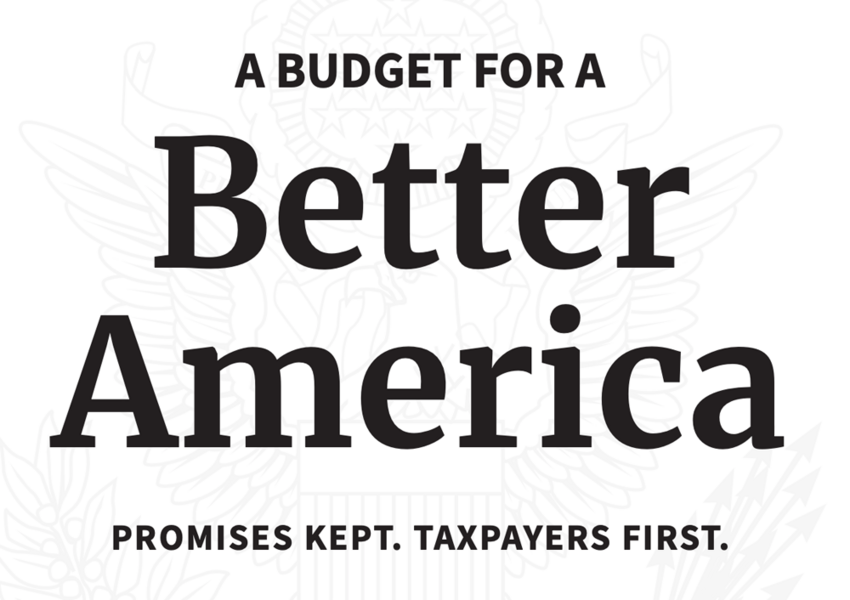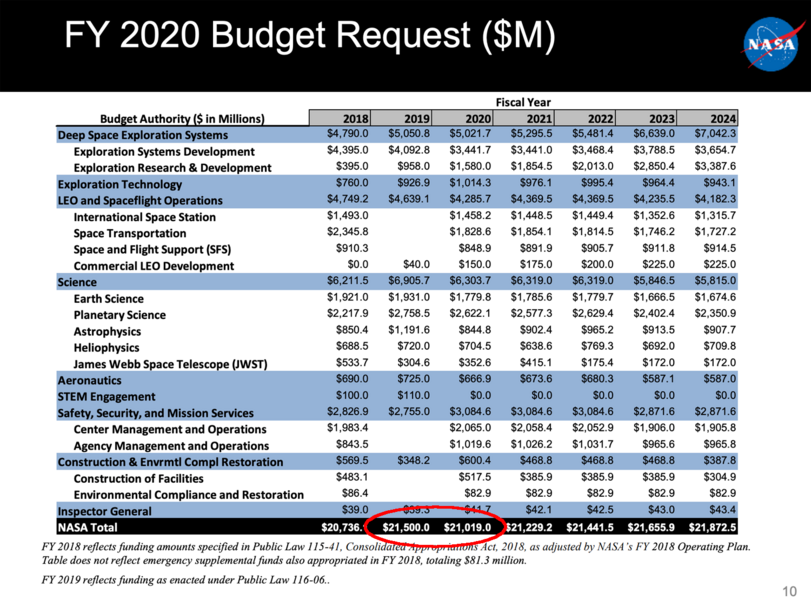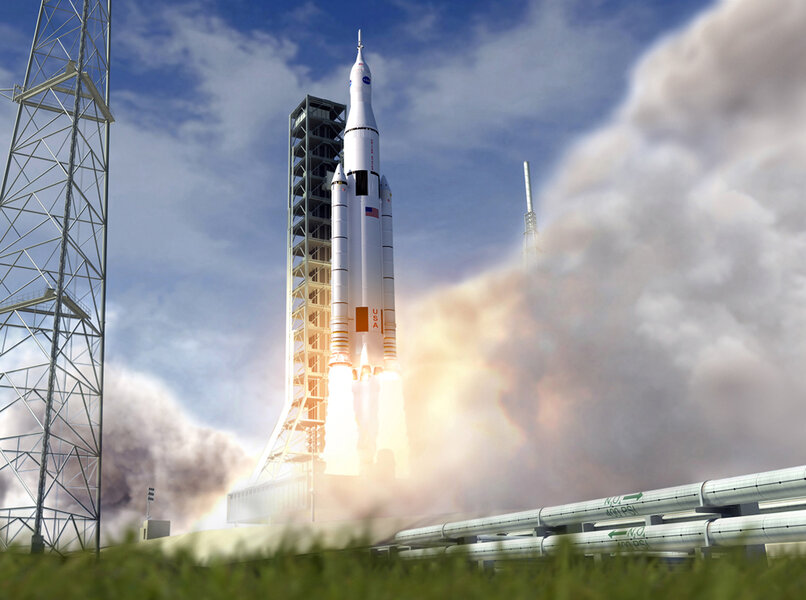Create a free profile to get unlimited access to exclusive videos, sweepstakes, and more!
Trump’s proposed NASA budget for 2020 is a disaster
So, the White House just released their annual Presidential Budget Request (PBR) for 2020. And, as I expected, it’s basically an epic disaster.
The good news is that this isn’t a final budget: It’s just a request, a baseline idea presented by Trump’s administration. What happens next is that Congress will look it over, then the House and Senate will each individually make changes to it. Then the two chambers meet to hash out a compromise between them, and that will be presented back to Trump to sign or not.
I’ll get back to that, because, as we’ve seen, that’s unlikely to go smoothly.
I want to focus on NASA’s piece of the PBR, but I have to note that this budget is, well, evil. That’s the only word for it. The lies start literally before Page 1, right smack dab in the title:
“Promises kept”? Well, the PBR cuts over a trillion dollars from Medicare and Medicaid, and Trump specifically promised not to do that in his campaign:
It also budgets $8.6 billion for the southern border wall, which Trump promised over and over again that Mexico would pay for. Unless Mexico pays taxes to us I’m pretty sure that was a lie as well.
I’ll let others pick apart the devastation this budget would do as is (noting that the National Science Foundation will take a huge 1 billion dollar hit), but with that said, let’s look at NASA.
Overall, the amount pledged to NASA is $21.019 billion. The PBR then says this is a 1.4% increase over the 2019 estimate, but that’s grossly misleading. It’s more than the 2019 Presidential request, but remember the budget then goes to Congress for revision. In reality, NASA’s actual enacted budget for 2019 was about $21.5 billion, so in real numbers this is more than a 2% cut to NASA.
The Planetary Society website has some of the more specific numbers, though the detailed budget line items won’t be released until next week. Even so, these overall numbers make me (for the most part) pretty unhappy. There’s a lot to parse, so — given this is not the final budget that will be passed — I’ll just hit a few highlights.
The first thing that jumped out at me was the complete cancellation of the WFIRST budget. Zeroed out. Boom. Gone. WFIRST is the Wide-field Infrared Survey Telescope, a Hubble-class space observatory designed to take wide-angle images of the sky in infrared, literally 100x larger in area than Hubble images. It’s a top priority for astronomers, with a launch date in the mid 2020s. It will complement the James Webb Space Telescope, looking at larger targets that can then be drilled down using JWST.
Obviously, killing this in the budget is a big deal. But I’ll note that last year, the PBR did this in the 2019 budget as well, zeroing out the funding for WFIRST. However, Congress then put it back in for a total of over $300 million. WFIRST has already been through a series of cost-cutting reductions, hobbling it a bit in the science it can do, so I hope that Congress sees its way to restoring the funding. I expect they will as they did last year, but that doesn’t make the next few months fun for anyone on the project.
Also zeroed out is what used to be called the Education Office but is now the STEM (Science, Technology, Engineering, and Math) Engagement office. Opinions on this are mixed among people I talk to, but overall I like the idea of a central office for NASA outreach activities. The amount budgeted for last year, $110 million, is small potatoes almost any way you look at it, which makes this seem putative on Trump’s part. I’ll note, like WFIRST, this was also zeroed out in the 2018 budget but then was put back in by Congress. I hope they do it again.
To the surprise of exactly no one, Science took a huge hit. Trump’s entire platform is digging in against reality, especially climate science, so these draconian cuts are appalling, but not exactly shocking. Astrophysics takes a huge hit of 20% and Earth Science (which funds climate science) is slashed nearly 8%. James Webb is the only survivor here, getting an actual budget increase. But that pales when compared to everything else getting eviscerated. For example, the PBR calls for the cancelling of PACE and CLARREO Pathfinder missions, both Earth-observing satellites related to climate. Again, this happened in earlier PBRs but the budgets were restored by Congress.
Exploration — that is, crewed space exploration — takes a modest overall ding of 0.6%, but that glosses over important details. The Orion crew capsule and Space Launch System (the huge rocket NASA is developing, and which I have been very, very vocally against for years) took big hits, 9 and 17% respectively. The details of this are interesting, but instead of going into them here I’ll link to my colleague Eric Berger at Ars Technica so you can read them. Basically, the Exploration Upper Stage, the big second stage booster to SLS needed to get to humans to the Moon, has been deferred so that NASA can focus on getting the first stage done.
The stated reason is due to delays and cost overruns on the first stage development, which have plagued this project and which are the main reasons I am against SLS. That, plus the fact that we don’t need it. As Berger points out in his article, the budget itself notes that a future mission to Jupiter’s moon Europa will launch on a commercial vehicle and not SLS; that will save $700 million. I suspect that many if not most deep space missions would do better on something like the Falcon Heavy, because it’s vastly cheaper to launch, and I suspect will be more reliable.
The winner here is the Lunar Gateway, a small space station to be placed into lunar orbit to facilitate exploring the Moon. That got a whopping 80% raise. Weirdly, the budget also says SLS will not be used to launch it, but instead will rely on commercial rockets. This means that essentially every task for SLS has been removed save one: Sending an Orion capsule into lunar orbit. That seems like an odd thing to leave as the single mission for a rocket that has already had over $12 billion spent on it, given that many, many more billions still need to be spent. It’ll also cost more than a billion dollars to launch every time, by the way.
Senator Richard Shelby of Alabama is a big proponent of SLS — it’s managed by Marshall Space Flight Center in Huntsville in his state — so much that it’s sometimes called the Shelby (or Senate) Launch System. I imagine he won’t like this budget much, and will restore much of the SLS funding.
The PBR does stress returning to the Moon, of which I approve, though not the way things are laid out today. It also talks about getting a sample return mission from Mars, which is also a good idea (getting rocks and such back here on Earth allows scientists to use much more sophisticated analysis tools than they can put on a lander). So there are some (very few) bright spots in this budget, but overall, well, it’s a disaster for NASA and for science.
Obviously, there’s a lot to parse here and I could go on and on, but you get the point. I urge you to read the links I’ve provided in this article and see for yourself what’s going on. If you are as incensed as I am — and oh boy am I — I strongly urge you to contact your Representative and Senators and tell them what you think.
A great place to start is 5calls.org, where you can get the info you need to contact Congress. If you call you may get a machine, or you may get a staff member. Either way, I generally prepare a short script stating my name, where I live, and saying clearly that I am a constituent. Then I give a few short statements making my opinions clear, and end with a request to do something; for example, asking that WFIRST and the STEM Engagement Office be reinstated at full budget, and that other science missions also be fully funded… especially those dealing with climate.
Remember, this budget is not final. What actually does get enacted is mostly up to Congress, and technically speaking we are their bosses. Let them know what you think.





























